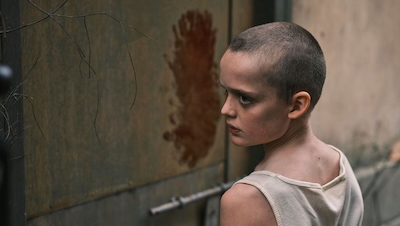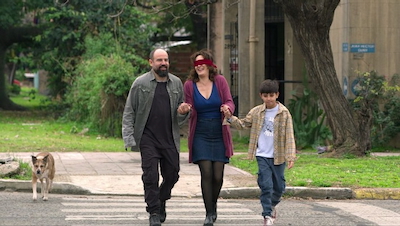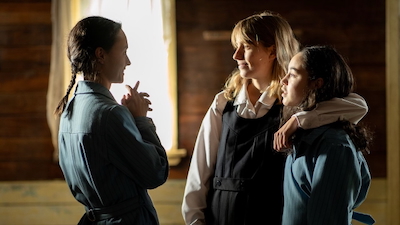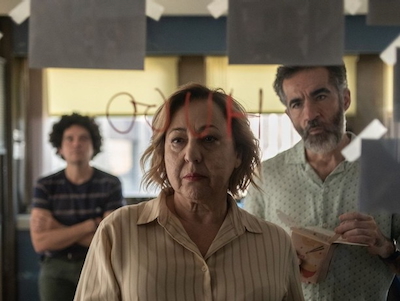FILM REVIEWS:
BEAUTIFUL EVENING, BEAUTIFUL DAY (Lijepa večer, lijep dan)(Croatia/Canada/Poland/Cyprus/Bosnia/Herzegovinia 2024) ***
Directed by Ivona Juka

Despite the bright and cheery title of the film, BEAUTIFUL EVENING, BEAUTIFUL DAY is a very solemn, serious and tough film to watch, depicting a time in the history of then, Yugoslavia when homosexuality was outlawed and gays were punished, imprisoned and beaten almost to death.
The film begins in 1944 where 4 friends fight as rebels against the Nazis, thus deemed heroes. But their sexual orientation cannot be forgiven and they are then exposed and punished.
The film is shot in Croatian and in black and white.
The film follows four close friends—Lovro, Nenad, Stevan, and Ivan—who, as young students, joined the Partisan resistance during World War II to fight against the Ustashas and Nazis. Sixteen years later, in 1957, they had become renowned filmmakers in Communist Yugoslavia. However, their sexual orientation raises suspicion among the authorities. A Communist Party loyalist named Emir is assigned to sabotage their careers and lives. As the friends strive to maintain their artistic integrity and personal freedom, Emir's own beliefs are challenged.
Of all the film;’s characters the most intriguing one is that of Emir. At one point, he invites the 4 friends to his cottage by the sea while the 4 frolic around. He sympathizes with them, yet turns them in. This is a troubled soul who is always wrestling with his conscience. His love life is also empty and he longs for companionship. The film shows him finally doing the right thing.
One thing about the film is that the actors portraying the characters with a 16-year difference do not age at all, in looks, which makes it all look a bit weird.
The film is more positive in the first half before turning really harsh in the second half, with a few very hard-to-watch segments like the beating of the gay characters. The segment really makes the audience wonder why there is so much hate and disgust for fellow human beings.
Director Juka grew up with a family member who was never allowed to "come out" and lived in the shadows of his true self. Juka was inspired to shed light on a dark time in history. Through the director’s extensive research, which included PhD theses on homosexual persecution in communist Yugoslavia, he discovered the remarkable resilience and unwavering strength of those who fought for their right to be different and authentic, which he depicts in the film. Despite the persecution and imprisonment, they never gave up. This film pays tribute to their courage, but it is also about our power of love to conquer hate and a call for acceptance and understanding in our polarized world. Homosexuality was just barely acceptable in the new (Yugoslavian) regions in the 1990s.
The film also delves into the other themes of love, loyalty, artistic expression, and political oppression.
It was selected as Croatia’s official submission for the 97th Academy Awards for Best International Feature Film, though it was not shortlisted. The film opens in theatres across Canada (at the Imagine Cinemas in Toronto) on May 30th.
Trailer:
BRING HER BACK (Australia 2025) ****
Directed by Danny and Michael Philippou

Bring Her Back is an upcoming Australian horror film directed by Danny and Michael Philippou, and written by Danny Philippou and Bill Hinzman. The Philippou brothers wowed the film world with their debut horror film TALK TO ME a year ago. Their latest horror feature is impressively better and scarier, covering the subjects of bringing the dead back to life and the trauma of children losing their parents and moving into a foster home.
Following the death of their father, step-siblings Andy (Billy Barratt) and Piper (Sora Wong), who is visually impaired, are placed in foster care with Laura (Sally Hawkins), a woman mourning the loss of her own daughter. Laura also cares for a peculiar, mute boy named Ollie (Jonah Wren Phillips). As the children adjust to their new home, they uncover a terrifying ritual linked to Laura's attempts to cope with her grief.
For a horror film, the performances are top-notch, especially those of the children. Billy Barratt is excellent as the tormented elder brother, Andy and Jonah Wren Phillips is really scary as the troubled Oliver, made even more frightening by the excellent horror make-up. But the main acting prize belongs to British actress Sally Hawkins. Hawkins is one of the best actresses working today, having earned an Oscar nomination playing Cate Blanchett’s sister in Woody Allen’s BLUE JASMINE. She broke into fame in Mike Leigh’s HAPPY-GO-LUCKY. Hawkins is an inspired casting, she always plays roles of troubled characters. In BRING HER BACK, she gets to show the scariest of all the characters that she has played, one that changes from victim to predator to just a confused human being. Hawkins is excellent to watch, and BRING HER BACK has Hawkins in one of her best roles.
The film explores the depths of sorrow and the lengths one might go to alleviate it. There is great emotional distress, well played and delivered in the film making BRING HER BACK a realistic and disturbing feel-bad film, but in a good way.
The Philippous have created one horror segment in this film that is so scary that it is guaranteed (almost) to have anyone turn away. This is the scene in which Andy hands the disturbed Oliver a piece of melon at the edge of a sharp knife. Another scene has Andy in his room on the bench lifting a heavy barbell. Whenever someone lifts a barbell on a bench in a horror film, one can guess what is going to happen.
The film also has an excellent beginning in which the words “This is not s Cult” appear on the screen. Blurred but disturbing images are shown on the screen, illustrating the fact that one need not see everything, but much is left to the imagination to experience true horror.
BRING HER BACK has so far garnered rave reviews. On the review aggregator website Rotten Tomatoes, 91% of 45 critics' reviews are positive. It is truly the best horror film opening this year and is on my list for the top 10 films of 2025.
Trailer:
THE HEART KNOWS (Corazón delator)(Argentina 2025) **
Directed by Marcos Carnevale

After a heart transplant, Manuel feels a personality shift and explores his donor's life, leading him to meet the widowed Vale and her community.
Though the film explores themes of love, loss, identity, and redemption, offering a poignant narrative about how lives can intertwine in unexpected ways, the film feels condescending to its audience, with too much sentimentality all mired in cliched territory, the script cannot seem to escape from. Those who enjoy the romances of Harlequin novels should not be disappointed.
Though the film caters towards a female target audience, the film's central character is a male. Juan Manuel (Benjamín Vicuña), a wealthy and emotionally distant businessman who undergoes a life-saving heart transplant. Following the surgery, he begins to experience profound emotional changes that lead him to investigate the life of his heart donor, Pedro, a humble and kind-hearted man. Many suspense thrillers have the same narrative, but this film opts for romance.
As Juan Manuel delves into Pedro's past, he meets Valeria (Julieta Díaz), Pedro's widow, and becomes deeply involved in her close-knit community. Concealing his true identity and the fact that he carries Pedro's heart, Juan Manuel finds himself falling in love with Valeria. It is a little too convenient that the script calls for Juan to just break up with his girlfriend before meeting Valeria. He also takes it upon himself to support and uplift the community (the community is about to face eviction) that Pedro cherished, all while grappling with the complexities of his secret.
THE HEART KNOWS (Corazón delator) is a Netflix original movie and opens for streaming Friday.
Trailer:
WE WERE DANGEROUS (New Zealand 2024) ***
Directed by Josephine Stewart-Te Whiu

The abuse of young women in WE WERE DANGEROUS reminds one of a similar Irish 2002 film, Peter Mullan’s THE MAGDALENE SISTERS. In that film, three young Irish women (just as the three girls in WE WERE DANGEROUS) struggle to maintain their spirits while they endure dehumanizing abuse as inmates of a Magdalene Sisters Asylum. In both films, the three girls attempt an escape. While the escape is more difficult in WE WERE DANGEROUS, as the girls are housed on an island, an escape means escaping by sea, the MAGDALENE SISTERS, ironically, escape just through a door that was unlocked - so easy an escape that no one ever tried. The abuse of the Magdalene sisters was much worse. Both films are excellent pieces for the examination of abuse in institutionalized systems. And both films celebrate the resilience of the abused young women, working together to survive a corrupt system
It should be noted that though the film feels as if it is based on true events, it is not. The film is a fictional narrative; however, it draws significant inspiration from real historical events and systemic issues in 1950s New Zealand. Director Josephine Stewart-Te Whiu and writer Maddie Dai crafted the story by researching New Zealand's eugenics movement, the Mazengarb Report, and the Royal Commission of Inquiry into Abuse in Care. They also consulted with survivors of state care institutions, including Stewart-Te Whiu's own father, to ensure authenticity in depicting the experiences of marginalized youth during that era. While the characters and specific events are fictional, the film successfully reflects the broader historical context of institutional abuse and the suppression of indigenous culture in mid-20th-century New Zealand.
The story centres on three of the 12 girls, imprisoned on the island for reform. Daisy (Manaia Hall) and Nellie (Erana James), who are both Māori and from working-class backgrounds, are arrested for petty theft. Daisy, we are told, had been in the care of seven different foster families by the age of 12 and tried to escape from all of them. Louisa (Nathalie Hall) is from a wealthy white family. She is sent away as a “sex delinquent” in an attempt to “cure” her of homosexuality. The “school” is really a prison, located on a small and otherwise uninhabited island. The girls’ education consists of mind-numbing Bible study and absurd “etiquette” classes (all of which are played more for entertainment than for reality) where they are taught how to make polite conversation and how to sit properly and be ladies. The girls are frequently slapped by the Matron (Rima Te Wiata), who runs the school, an unhinged and violent religious fanatic. The matron is too easy a target, and the film would have benefited Mohave to make her feel a bit of sympathy.
The film is entertaining to the point of fault. Though the abuse of the girls is displayed, the physical and mental torture is not as brutal or as violent as in Peter Mullan’s film (THE MAGDALENE SISTERS).. The result is that WE WERE DANGEROUS finally comes across as a feel-good film of escape, compared to one where mental anguish and physical abuse have long-lasting effects.
WE WERE DANGEROUS opens in Toronto May 30, and plays at imagineNATIVE June 5 while debuting digitally across Canada June 3.
Trailer:
A WIDOW’S GAME (La viuda negra)(Spain 2025) ***
Directed by Carlos Seles

True crime documentaries are among the most intriguing genres to watch. Netflix seems to have cornered the market with recent hits like COLD CASE: THE TYLENOL MURDERS, a docu-series that also opens this week, AMERICAN MURDER: THE FAMILY NEXT DOOR, and two other series, THE STAIRCASE and MAKING A MURDERER.
Premiering on May 30, 2025, A WIDOW’S GAME, a Spanish-language film, dramatizes the 2017 murder of Antonio Navarro (“Crime of Patraix”) in Valencia, orchestrated by his wife, María Jesús Moreno (known as Maje), and her lover. The film combines fidelity to the actual events with a focus on psychological intrigue, utilizing real police recordings and judicial documents. It can be best described as a fiction film inspired by true events.
The story is set in Novelda. Maybe and Mariawere from there before moving to the city of Valencia. Novelda is a town located in the province of Alicante, Spain. As of 2009, it has a total population of 27,135 inhabitants. Novelda has important quarries and mines of marble, limestone, silica, clay and gypsum. It is a major centre of the marble industry.
In August 2017, Antonio Navarro Cerdán was found stabbed to death in a parking garage in Valencia. His wife, María Jesús Moreno Canto—known as “Maje" (Ivana Baquero) —initially appeared as a grieving widow. However, investigations revealed she had orchestrated the murder with her lover and coworker, Salvador Rodrigo (Tristan Ulloa). Salvador confessed to the stabbing, claiming he was manipulated by Maje, who alleged her husband was mistreating her. The investigation is doggedly carried out by a no-nonsense investigator, Inspector Eva (Carmen Machi).
The film unfolds in Chapters, each offering the audience a different point of view, beginning with the investigator Eva, followed by Maje, and then Salvo. The dates that have elapsed after the murder are also shown on the screen as the audience watches how the investigation progresses.
“You might know your way around the office. But you do not know your way around the streets,” says an angry Eva to her boss after being taken off the case of her good friend and colleague being murdered. She says her homicide department has a 98% successful closing, much better than Madrid's, as her boss was passing the case on to the Organized Crime Unit, which is the reason Eva is so upset.
One flaw of the film is that the audience knows at the very start that the widow is guilty. The Spanish title, which translates to Black Widow, says it even more clearly. The fact is also made known to the audience quite early in the film, around the 20-minute mark, after Eva hears the recordings from Maje’s trapped telephone line.
Carmen Machi steals the show as the murder investigator. She is in her middle age, plump, efficient, and takes no nonsense, playing like an expert sloth to the likes of class detectives like the fictional Hercule Poirot or Miss Marple.
A WIDOW'S GAME opens for streaming on Netflix this week.
Trailer:





Comments powered by CComment